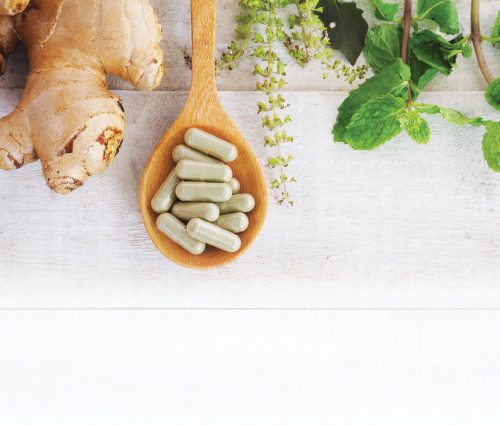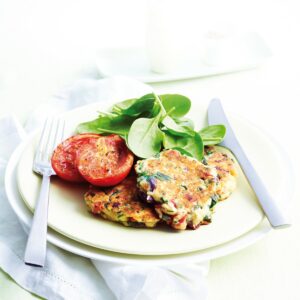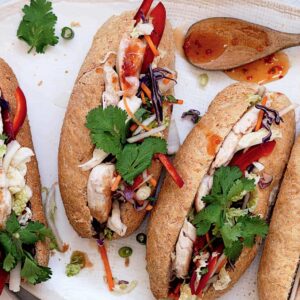
Do you need supplements to stay healthy? Dietitian Karissa Woolfe explores what your body needs at every life stage.
Shelves in the health-food aisle of supermarkets and pharmacies are stacked with colourful supplements.
Over a third of women and a quarter of men reported regularly using dietary supplements in the last national nutrition survey, but how do you know if they’re something your body needs, or expensive ‘snake oil’?
Evidence suggests you can meet most of your health needs by eating a well-balanced diet. But there are times in your life when you might need a ‘top up’ to meet your extra requirements.
Here’s an easy guide to what to swallow, decade by decade, from your 20s through to your 60s.
In your 20s
Research shows peer groups and social media shape women’s eating habits in their 20s.
Those who spend a lot of time on social media can develop an unhealthy obsession with maintaining a perfect diet (known as orthorexia nervosa).
This can lead to depression, body-image issues and an unhealthy relationship with food, which may increase their chance of developing a nutrient deficiency. Warning signs include cutting out whole food groups, such as meat, dairy or whole grains or, at the other extreme, overeating junk food or binge drinking. Unhealthy choices, combined with iron losses from menstruation, is a recipe for fatigue and potential deficiencies.
You need… iron
Young women need 18mg of iron a day to prevent anaemia, but the national nutrition survey shows young women only get little over half this from food. The mineral is also poorly absorbed, so it is worth considering an iron supplement, especially if you’re vegetarian or vegan, have heavy periods or are planning a pregnancy. Talk to your doctor about having your iron levels tested via a blood test.
Eat… more vitamin C
You’ll find iron in beef, chicken, lamb, baked beans and grainy bread, but it’s important you pair them with vitamin C-rich foods to better absorb the iron. Add capsicum and broccoli to stir-fries, or eat an orange with your morning baked beans on toast.
Plus… dose up on dairy
Your bone density is set in your 20s, so this is the time to deposit bone-strengthening calcium to prevent osteoporosis later in life. Kiwi women in their 20s average only three-quarters of the calcium they need from their diet. Dairy foods are a rich source – a 250ml glass of high-calcium milk, a small (150g) tub of yoghurt and two slices of cheese (30g) every day will hit your calcium target.
In your 30s
This is a decade of partnering and parenting, plus big changes to meals, fitness and sleep routines.
Two foods that women in their 30s need to focus on eating more are veges and wholegrain bread. Why? Veges and grainy bread provide hunger-busting fibre, which promotes a healthy weight and are a rich source of folate and iodine. These nutrients are essential for mums-to-be to ensure the healthy development of their babies. Pregnancy and breastfeeding are key times women may need additional nutrients, but ask your doctor which supplements, if any, are worth taking. A recent study in Australia found 63 per cent of mums-to-be took a supplement, but some popular brands didn’t follow recommendations and could, in fact, increase the risk of harm.
You need… folate and iodine
For healthy development of babies, folate and iodine supplementation is definitely worth it. Mums-to-be are recommended to take a daily supplement with 800mcg of folate and 150µg of iodine. Your doctor may also check your vitamin D and iron levels, and recommend a vitamin B12 and omega-3 supplement if you are vegetarian.
Eat… wholegrain bread
Most bread is fortified with iodine and wholegrain bread is a source of folate. Eggs are a good source of both folate and iodine, while other folate sources include leafy greens and chickpeas.
Plus… bump up the fruit
Be sure to get at least two serves a day as fruit provides vitamin C to enhance iron absorption and fibre to ease constipation. Enjoy an orange or kiwifruit every day.
In your 40s
Your 40s are a time to feel your best, but often women find themselves busier than ever before. A recent study monitoring the effect of juggling family and work commitments found that time pressures worsen in middle age. This may explain ‘wine o’clock’, with more women drinking at harmful levels, which can increase the risk for developing breast cancer and dementia later in life.
Women are notorious for putting their health needs last in the family. Studies link skipping meals with weight gain, a habit that also deprives your body of fuel and nutrients needed to stay healthy.
The key to longer-lasting energy and a healthy body weight is eating nutritious meals regularly across the day and limiting alcohol.
You need… B vitamins
Your body needs B vitamins to release energy from food and to detox alcohol. Because you’ll find them in wholegrain bread and cereals, dairy foods, leafy green vegetables and eggs, it’s worth saving your money rather than spending on supplements. But a vitamin B12 supplement may be recommended if you are vegan. You can become B-vitamin deficient if you don’t eat enough food in general, or if you drink too much alcohol. But before rushing out to buy Berocca, discuss it with your doctor, as some B vitamins can be toxic if taken incorrectly.
Eat… high-fibre grains
It’s recommended to eat at least six servings of grain foods daily. But many women limit their grains and miss out on energy. So, go for grains to boost your B vitamins! A standard serving of whole grains is a slice of bread, or a half-cup of muesli, cooked porridge, brown rice or quinoa.
Plus… ramp up self-care
Self-care helps you to avoid burning out. Setting an example for your family by eating well, prioritising fitness and getting enough sleep is a great gift.
In your 50s
Hello, menopause! Your 50s is when metabolism slows down, you lose muscle and bone strength and gain belly fat.
This ‘middle-aged spread’ can lead to fatty liver, high cholesterol, high blood pressure and insulin resistance, which increases your risk of developing type 2 diabetes and heart disease.
You can help to reduce your risk of a heart attack by eating a healthy diet and getting your blood pressure and cholesterol checked regularly by your GP.
You need… vitamin D
Globally, one in three women over 50 will experience a fracture due to brittle bones. Women with higher vitamin D levels have stronger bones and fewer fractures. Sunlight helps your body make vitamin D, but women with dark skin or living in southern regions are at greater risk of low levels. A supplement is a safe and effective way to restore vitamin D levels, so worth taking if your GP finds you are deficient.
Eat… calcium-rich foods
Once you turn 50, your calcium requirements increase to 1300mg a day to protect your bones. If you’re not up for four servings of dairy each day, try increasing your intake of other calcium-rich foods, such as fortified soy milk, canned salmon with bones, tofu and leafy green veges. Taking a calcium supplement may seem easier, but some studies have linked these supplements with an increased risk of heart attack or stroke, so consult your GP before taking them.
Plus… pick up weights
Weight-bearing exercise, such as lifting weights or walking outside, is recommended twice a week to strengthen bones. This also helps to rev up your metabolism and keep you strong.
In your 60s and beyond
As you head into your 60s and beyond, maintaining an active body and mind is the focus.
An empty nest and pending retirement can make you want to wind down, as can health concerns such as stiff joints and the onset of such chronic conditions as arthritis and type 2 diabetes.
But the evidence is clear: to age well, you need to continue to eat healthily and stay active. As we age into our 60s and beyond, women are twice as likely as men to develop knee osteoarthritis, are more likely to have a heart attack, and dementia becomes a leading cause of death.
The good news is, studies suggest a Mediterranean style of eating is healthy for your heart, as well as your joints and brain.
You need… omega-3
If you aren’t a fan of fish, it is worth considering supplementation. The Heart Foundation recommends a marine-sourced omega-3 supplement of up to 1g a day as beneficial for heart health, if you don’t eat fish.
Eat… oily fish, nuts and seeds
Eating oily fish, such as fresh or canned salmon, twice a week, and plant sources of omega-3 fatty acids, including walnuts, linseeds and chia seeds, daily can provide the recommended amount for good health.
Plus… keep moving
Continuing to strength train twice a week strengthens your bones, and evidence suggests it helps your heart and brain, too. A University of Sydney study found adults aged 55 to 86 who did this for six months improved their cognitive function and lowered their risk of dementia.
Article sources and references
- Aljadani et al. 2016. Diet quality and 6-year risk of overweight and obesity among mid-age Australian women who were initially in the healthy weight range. Health Promotion Journal of Australia 27:29-35
- Alzheimers New Zealand, alzheimers.org.nz Accessed Februray 2018http://www.alzheimers.org.nz/
- Better Health Channel. 2014. Vitamin B, betterhealth.vic.gov.au Accessed November 2017https://www.betterhealth.vic.gov.au/health/healthyliving/vitamin-b
- Better Health Channel. 2014. Pregnancy and diet, betterhealth.vic.gov.au Accessed November 2017https://www.betterhealth.vic.gov.au/health/healthyliving/pregnancy-and-diet
- Brown et al. 2016. Maintaining a healthy BMI: Data from a 16-year study of young Australian women. American Journal of Preventive Medicine 51:e165-78https://www.researchgate.net/publication/310750959_Maintaining_a_Healthy_BMI
- Brown W & Pavey T. 2016. Physical activity in mid-age and older women: Lessons from the Australian Longitudinal Study on Women’s Health. Kinesiology Review 5:87-97https://www.ncbi.nlm.nih.gov/pubmed/28477211
- Dontje et al. 2016. Effect of diagnosis with a chronic disease on physical activity behavior in middle-aged women. Preventative Medicine 83:56-62https://www.ncbi.nlm.nih.gov/pubmed/26656407
- Farina et al. 2011. Dietary intakes of arachidonic acid and alpha-linolenic acid are associated with reduced risk of hip fracture in older adults. Journal of Nutrition 141:1146-53https://www.ncbi.nlm.nih.gov/pubmed/21508210
- Galea et al. 2017. Whole grain intake of Australians estimated from a cross-sectional analysis of dietary intake data from the 2011-13 Australian Health Survey. Public Health Nutrition 20:2166-72https://www.ncbi.nlm.nih.gov/pubmed/28592344
- Gorton D. 2012. Evidence update: Fish, fish oils and heart health. Heart Foundation of New Zealand.https://www.heartfoundation.org.nz/shop/nutrition/docs/dairy-and-heart-health-evidence-paper.pdf
- Hunter Medical Research Institute. 2016. Depression risk for young female binge drinkers, hmri.org.au Accessed November 2017https://hmri.org.au/news-article/depression-risk-young-female-binge-drinkers
- International Osteoporosis Foundation. 2017. Facts and Statistics, iofbonehealth.org Accessed November 2017https://www.iofbonehealth.org/facts-statistics
- Jean Hailes. 2017. Vitamin D, jeanhailes.org.au Accessed November 2017https://jeanhailes.org.au/health-a-z/healthy-living/nutrients/vitamin-d
- Koupil et al. 2016. Social patterning of binge eating, bulimia and compensatory behaviours in young adult women: Results from the Australian Longitudinal Study on Women’s Health. Public Health Nutrition 19:3158-68https://www.ncbi.nlm.nih.gov/pmc/articles/PMC5217467/
- McEvoy et al. 2017. Neuroprotective diets are associated with better cognitive function: The health and retirement study. Journal of the American Geriatrics Society 65:1857-62https://www.ncbi.nlm.nih.gov/pubmed/28440854
- McKenna et al. 2017. Dietary supplement use during preconception: The Australian Longitudinal Study on Women’s Health. Nutrients 9:1119https://www.ncbi.nlm.nih.gov/pmc/articles/PMC5691735/
- Ministry of Health and Cancer Society of New Zealand. 2012. Consensus statement on vitamin D and sun exposure in New Zealand. Wellington: Ministry of Healthhttps://www.health.govt.nz/publication/consensus-statement-vitamin-d-and-sun-exposure-new-zealand
- Mishra et al. 2015. How do women’s diets compare with the new Australian dietary guidelines? Public Health Nutrition 18:218-25https://www.ncbi.nlm.nih.gov/pubmed/24589225
- Morris et al. 2015. MIND diet associated with reduced incidence of Alzheimer’s disease. Alzheimer’s & Dementia 11:1007-14https://www.ncbi.nlm.nih.gov/pubmed/25681666
- National Health and Medical Research Council. 2014. Iron, nrv.gov.au Accessed November 2017https://www.nrv.gov.au/nutrients/iron
- National Health and Medical Research Council. 2014. Vitamin D, nrv.gov.au Accessed November 2017https://www.nrv.gov.au/nutrients/vitamin-d
- National Heart Foundation of Australia. 2015. Fish and omega-3: Questions and answers, heartfoundation.org.au Accessed November 2017https://www.heartfoundation.org.au/images/uploads/main/Programs/Health_Professional_QA_Fish_Omega3_Cardiovascular_Health.pdf
- Orchard et al. 2012. A systematic review of omega-3 fatty acids and osteoporosis. British Journal of Nutrition 107:S253-260https://www.ncbi.nlm.nih.gov/pmc/articles/PMC3899785/
- Osteoporosis Australia. 2017. Vitamin D, osteoporosis.org.au Accessed November 2017 Otterbach et al. 2016. The effect of motherhood and work on women’s time pressure: A cohort analysis using the Australian Longitudinal Study on Women’s Health. Scandinavian Journal of Work, Environment & Health 42:500-9https://www.osteoporosis.org.au/vitamin-d
- Peña-Rosas et al. 2012. Daily oral iron supplementation during pregnancy. Cochrane Database of Systematic Reviews 12: CD004736https://www.ncbi.nlm.nih.gov/pubmed/23235616
- Reeves AJ et al. 2017. Calculation of haem iron intake and its role in the development of iron deficiency in young women from the Australian Longitudinal Study on Women’s Health. Nutrients 9:515https://www.ncbi.nlm.nih.gov/pubmed/28534830
- Royal Australian and New Zealand College of Obstetricians and Gynaecologists. 2015. Vitamin and mineral supplementation and pregnancy, ranzcog.edu.au Accessed November 2017
- Scott S & Branley A. 2015. Women aged 35 to 59 engaged in high-risk drinking at problem levels, study warns, abc.net.au Accessed November 2017https://www.abc.net.au/news/2015-02-11/baby-boomer-women-turning-to-booze-at-problem-levels/6086378
- Turner PG & Lefevre CE. 2017. Instagram use is linked to increased symptoms of orthorexia nervosa. Eating and Weight Disorders 22:277-84https://www.ncbi.nlm.nih.gov/pubmed/28251592
- University of Otago and Ministry of Health. 2011. A focus on nutrition: Key findings of the 2008/09 New Zealand adult nutrition survey. Wellington: Ministry of Healthhttps://www.health.govt.nz/publication/focus-nutrition-key-findings-2008-09-nz-adult-nutrition-survey
- University of South Australia. 2017. Obesity may be a factor for fractures, unisa.edu.au Accessed November 2017https://www.unisa.edu.au/Media-Centre/Releases/2017-Media-Releases/Obesity-may-be-a-factor-for-arm-and-ankle-fractures/
- University of Sydney. 2016. Increasing muscle strength can improve brain function: Study, sydney.edu.au Accessed November 2017https://sydney.edu.au/news-opinion/news/2016/10/25/increasing-muscle-strength-can-improve-brain-function--study.html
- Vissers et al. 2017. A pro-inflammatory diet is associated with increased risk of developing hypertension among middle-aged women. Nutrition, Metabolism Cardiovascular Diseases 27:564-70https://www.ncbi.nlm.nih.gov/pubmed/26644215
www.healthyfood.com











